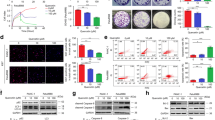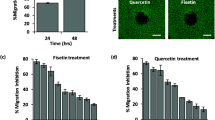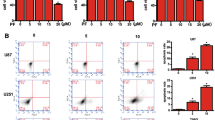Abstract
Pancreatic cancer is one of the most dangerous cancers and is associated with a grave prognosis. Despite increased knowledge of the complex signaling networks responsible for progression of pancreatic cancer, many challenging therapies have fallen short of expectations. In this study, we examined the anti-migratory effect of quercetin 3-O-glucoside in epidermal growth factor–induced cell migration by inhibiting EGF receptor (EGFR) signaling in several human pancreatic cancer cell lines. Treatment with quercetin, quercetin 3-O-glucoside, and quercetin 7-O-glucoside differentially suppressed epidermal growth factor–induced migration activity of human pancreatic cancer cells. In particular, quercetin 3-O-glucoside strongly inhibited the infiltration activity of pancreatic cancer cells in a dose-dependent manner. Furthermore, quercetin 3-O-glucoside exerted the anti-migratory effect even at a relatively low dose compared with other forms of quercetin. The anti-tumor effects of quercetin 3-O-glucoside were mediated by selectively inhibiting the EGFR-mediated FAK, AKT, MEK1/2, and ERK1/2 signaling pathway. Combinatorial treatment with quercetin 3-O-glucoside plus gemcitabine showed the synergistic anti-migratory effect on epidermal growth factor–induced cell migration in human pancreatic cancer cell lines. These results suggest that quercetin 3-O-glucoside has potential for anti-metastatic therapy in human pancreatic cancer.






Similar content being viewed by others
References
Siegel R, Ma J, Zou Z, Jemal A. Cancer statistics, 2014. CA: Cancer J Clin. 2014;64:9–29.
Stathis A, Moore MJ. Advanced pancreatic carcinoma: current treatment and future challenges. Nat Rev Clin Oncol. 2010;7:163–72.
Bardeesy N, DePinho RA. Pancreatic cancer biology and genetics. Nat Rev Cancer. 2002;2:897–909.
Cano CE, Motoo Y, Iovanna JL. Epithelial-to-mesenchymal transition in pancreatic adenocarcinoma. Sci World J. 2010;10:1947–57.
Inoue S, Tezel E, Nakao A. Molecular diagnosis of pancreatic cancer. Hepato-Gastroenterology. 2001;48:933–8.
Formica JV, Regelson W. Review of the biology of quercetin and related bioflavonoids. Food Chem Toxicol : Int J Published British Ind Biol Res Assoc. 1995;33:1061–80.
Surh YJ. Cancer chemoprevention with dietary phytochemicals. Nat Rev Cancer. 2003;3:768–80.
Russo M, Spagnuolo C, Tedesco I, Bilotto S, Russo GL. The flavonoid quercetin in disease prevention and therapy: facts and fancies. Biochem Pharmacol. 2012;83:6–15.
Romagnolo DF, Selmin OI. Flavonoids and cancer prevention: a review of the evidence. J Nutr Gerontol Geriatr. 2012;31:206–38.
Yang JH, Hsia TC, Kuo HM, Chao PD, Chou CC, Wei YH, et al. Inhibition of lung cancer cell growth by quercetin glucuronides via g2/m arrest and induction of apoptosis. Drug Metab Disposition: Biol Fate Chem. 2006;34:296–304.
Gibellini L, Pinti M, Nasi M, Montagna JP, De Biasi S, Roat E, et al. Quercetin and cancer chemoprevention. Evid Based Complement Alternat Med: eCAM. 2011;2011:591356.
Murakami A, Ashida H, Terao J. Multitargeted cancer prevention by quercetin. Cancer Lett. 2008;269:315–25.
Razavi SM, Zahri S, Zarrini G, Nazemiyeh H, Mohammadi S. Biological activity of quercetin-3-o-glucoside, a known plant flavonoid. Bioorg Khim. 2009;35:414–6.
Mendelsohn J, Baselga J. Epidermal growth factor receptor targeting in cancer. Semin Oncol. 2006;33:369–85.
Oliveira-Cunha M, Newman WG, Siriwardena AK. Epidermal growth factor receptor in pancreatic cancer. Cancers. 2011;3:1513–26.
Lee J, Lee J, Yu H, Choi K, Choi C. Differential dependency of human cancer cells on vascular endothelial growth factor-mediated autocrine growth and survival. Cancer Lett. 2011;309:145–50.
Lee J, Ku T, Yu H, Chong K, Ryu SW, Choi K, et al. Blockade of vegf-a suppresses tumor growth via inhibition of autocrine signaling through fak and akt. Cancer Lett. 2012;318:221–5.
Korc M, Chandrasekar B, Yamanaka Y, Friess H, Buchier M, Beger HG. Overexpression of the epidermal growth factor receptor in human pancreatic cancer is associated with concomitant increases in the levels of epidermal growth factor and transforming growth factor alpha. J Clin Investig. 1992;90:1352–60.
Pryczynicz A, Guzinska-Ustymowicz K, Kemona A, Czyzewska J. Expression of egf and egfr strongly correlates with metastasis of pancreatic ductal carcinoma. Anticancer Res. 2008;28:1399–404.
Angst E, Park JL, Moro A, Lu QY, Lu X, Li G, et al. The flavonoid quercetin inhibits pancreatic cancer growth in vitro and in vivo. Pancreas. 2013;42:223–9.
Zhou W, Kallifatidis G, Baumann B, Rausch V, Mattern J, Gladkich J, et al. Dietary polyphenol quercetin targets pancreatic cancer stem cells. Int J Oncol. 2010;37:551–61.
Lee LT, Huang YT, Hwang JJ, Lee PP, Ke FC, Nair MP, et al. Blockade of the epidermal growth factor receptor tyrosine kinase activity by quercetin and luteolin leads to growth inhibition and apoptosis of pancreatic tumor cells. Anticancer Res. 2002;22:1615–27.
Morand C, Manach C, Crespy V, Remesy C. Quercetin 3-o-beta-glucoside is better absorbed than other quercetin forms and is not present in rat plasma. Free Radic Res. 2000;33:667–76.
Du XY, Huang J, Xu LQ, Tang DF, Wu L, Zhang LX, et al. The proto-oncogene c-src is involved in primordial follicle activation through the pi3k, pkc and mapk signaling pathways. Reprod Biol Endocrinol : RB&E. 2012;10:58.
Roby KF, Son DS, Taylor CC, Montgomery-Rice V, Kirchoff J, Tang S, et al. Alterations in reproductive function in src tyrosine kinase knockout mice. Endocrine. 2005;26:169–76.
Moore MJ, Goldstein D, Hamm J, Figer A, Hecht JR, Gallinger S, et al. Erlotinib plus gemcitabine compared with gemcitabine alone in patients with advanced pancreatic cancer: a phase iii trial of the national cancer institute of canada clinical trials group. J Clin Oncol : Off J Am Soc Clin Oncol. 2007;25:1960–6.
Conroy T, Desseigne F, Ychou M, Bouche O, Guimbaud R, Becouarn Y, et al. Folfirinox versus gemcitabine for metastatic pancreatic cancer. N Engl J Med. 2011;364:1817–25.
Von Hoff DD, Ervin T, Arena FP, Chiorean EG, Infante J, Moore M, et al. Increased survival in pancreatic cancer with nab-paclitaxel plus gemcitabine. N Engl J Med. 2013;369:1691–703.
Aranda E, Manzano JL, Rivera F, Galan M, Valladares-Ayerbes M, Pericay C, et al. Phase ii open-label study of erlotinib in combination with gemcitabine in unresectable and/or metastatic adenocarcinoma of the pancreas: relationship between skin rash and survival (pantar study). Ann Oncol : Off J Europ Soc Med Oncol/ESMO. 2012;23:1919–25.
Acknowledgments
This research was supported by Basic Science Research Program through the National Research Foundation of Korea (NRF) funded by the Ministry of Education (2009-0094059).
Conflicts of interest
None
Author information
Authors and Affiliations
Corresponding author
Rights and permissions
About this article
Cite this article
Lee, J., Han, SI., Yun, JH. et al. Quercetin 3-O-glucoside suppresses epidermal growth factor–induced migration by inhibiting EGFR signaling in pancreatic cancer cells. Tumor Biol. 36, 9385–9393 (2015). https://doi.org/10.1007/s13277-015-3682-x
Received:
Accepted:
Published:
Issue Date:
DOI: https://doi.org/10.1007/s13277-015-3682-x




